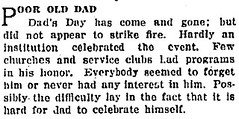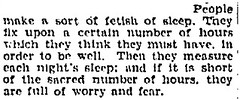 1. The overall quality of fathers and the celebration of their designated holiday has diminished (generally found in letter to the editor form).
1. The overall quality of fathers and the celebration of their designated holiday has diminished (generally found in letter to the editor form).
 2. Worrying about sleep deprivation is probably depriving you of sleep.
2. Worrying about sleep deprivation is probably depriving you of sleep.

 1. The overall quality of fathers and the celebration of their designated holiday has diminished (generally found in letter to the editor form).
1. The overall quality of fathers and the celebration of their designated holiday has diminished (generally found in letter to the editor form).
 2. Worrying about sleep deprivation is probably depriving you of sleep.
2. Worrying about sleep deprivation is probably depriving you of sleep.


 And so, Baby Week in Los Angeles was born. The program began in 1916 under Wilde’s direction, with the sponsorship of the Los Angeles District Federation of Women’s Clubs and the Los Angeles Chamber of Commerce. Features included lectures, educational booths, and most importantly, a physical screening for Los Angeles children under the age of 6. By 1927, over 88,000 children had been measured, weighed, and tested for a variety of disabilities, as well as malnutrition by Southern California doctors.
And so, Baby Week in Los Angeles was born. The program began in 1916 under Wilde’s direction, with the sponsorship of the Los Angeles District Federation of Women’s Clubs and the Los Angeles Chamber of Commerce. Features included lectures, educational booths, and most importantly, a physical screening for Los Angeles children under the age of 6. By 1927, over 88,000 children had been measured, weighed, and tested for a variety of disabilities, as well as malnutrition by Southern California doctors.
To infuse the proceedings with a little more fun, the Baby Show was introduced, and quickly became the centerpiece of Baby Week. Any mother whose child had been screened, and earned a “score” above 90% was invited to enter them in the contest. Of the 400 babies entered in this year’s competition, 8-month-old Lorene Phillips scored the highest – 99% perfect.
Dr. Wilde placated the audience, saying, “Of all the 88,000 babies we have examined, not one has scored 100%. To produce 100% perfect children, we must have 100% perfect parents. However, we must not be discouraged. It is possible that at the next show one of you mothers will exhibit the perfect baby.”